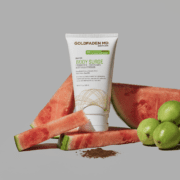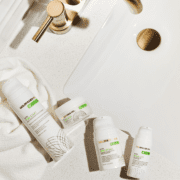Dr. G’s tips for relieving dry skin
Winter (or just cooler weather) can wreak havoc on skin, causing dryness, redness and dullness. The three main ways to keep a healthy glow are to hydrate, exfoliate and be gentle to your skin.
The most important part about a healthy winter glow is to stay hydrated. This is achieved in a few different ways. The first is by drinking a lot of water. Dry, cold air dehydrates you inside and out, so drink extra during the winter months.
We sat down with Dr. G to get the 411 on how to mitigate dryness and keep skin glowing, hydrated and supple all year round.
What are the main causes of dry skin?
Skin can be dry for numerous reasons. A few of the main culprits are the weather, the climate (humidity vs. dry), your age (as you age skin becomes drier), dirt, sun damage, bad diet and incorrect product and ingredient use.
The best ways of treating dry skin? Topical, non-topical?
Topical: If you have dry or sensitive skin, be careful with what types of ingredients to use topically. Stay away from astringents, acids, sodium lauryl sulfate and alcohol. Staying hydrated from the inside out is also crucial. Drink plenty of fluids. Always apply moisturizer or body oil to damp skin. Post bath or shower; try moisturizing your skin while still damp, this allows the skin to capture and seal in moisture. Take a look at your cleansing regimen, over exfoliation, particularly with physical scrubs, can be taxing and drying to the skin. Try decreasing the frequency and try a lactic acid enzymatic exfoliator as lactic acid pulls moisture to the surface of the skin.Choose a moisturizer or oil appropriate for dry skin. Good ingredients to look for are avocado oil, vitamin E, plant lipids, oils full of omega fatty acids, hyaluronic acid and plant extracts. Always wear an SPF when in the elements.
Non-topical: Similar to the thought process of what to topically use, what we ingest may help to prevent dryness. Choose foods high in omega 3 fatty fats, such as avocados, salmon, walnuts, eggs, olive oil, sea kelp and vegetables high in silica. Silica helps form collagen in the body. Look for oats, avocados, cucumbers, flax seeds and leafy green vegetables.
Should we ditch exfoliating from our skincare routine?
Moisturizing is a crucial part of keeping skin hydrated during the winter, but you shouldn’t ignore exfoliating. Look for scrubs that have moisturizing elements to them, such as jojoba oil , avocado oil and apricot seed oil. Oils are also very beneficial during the winter months to keep skin glowing, hydrated and plump.
Alternatively, grab your peels:
“Alpha Hydroxy Acids or AHA’s (which are Lactic acid, Glcolic acid and Fruit acids) are used as facial exfoliators. AHA’s are excellent options for people with sun damaged skin, aging skin, oily skin and normal to dry skin types. AHA’s do not cause sun sensitivity and come in numerous forms. AHA’s come in the form of lactic acid which is derived from milk, glycolic acid which is derived from sugarcane and fruit acids which are derived from fruits (citrus and apples/malic acid) and are gentle exfoliating agents that break apart the dead skin cells and pull hydration to the surface of your complexion which increases hydration and promotes a supple texture.” Dermatologist, Dr. Gary Goldfaden
Do certain foods help with dry skin?
Choose foods high in omega 3 fatty fats, such as avocados, salmon, walnuts, eggs, olive oil, sea kelp and vegetables high in silica. Silica helps form collagen in the body. Look for oats, avocados, cucumbers, flax seeds and leafy green vegetables.
Is dry skin dependent on our skin type? Yes and no.Skin can be dry for numerous reasons. A few of the main culprits are the weather, the climate (humidity vs. dry), your age (as you age skin becomes drier), dirt, sun damage, bad diet and incorrect product and ingredient use.










Leave a Reply
Want to join the discussion?Feel free to contribute!